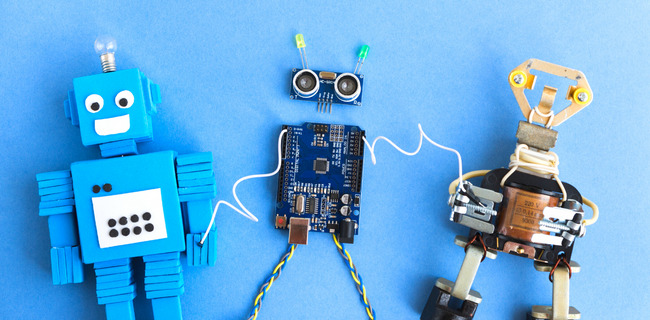
We Come in Peace – Working Cohesively (with Humans)
By Renée Cohen
Proposal Manager & Contributing Writer at Quantum
As a joke, in an effort to diminish the mounting tension that threatened the peace of a once harmonious investment firm, some analysts took to sporadically imitating robots. In the open concept back office, at random intervals, they repeated in unison, “We-are-work-ing-to-gether-co-hesively…we-are-work-ing-to-gether-co-hesively…”
For those of us who don’t wish to emulate robots in the workplace (not even in jest), sometimes our feelings and emotions can interfere with our ability to work cohesively with others. Yes, those same attributes that distinguish human beings from robots, are also responsible for some of the challenges we encounter when working with our own species.
Personality clashes and conflicts are bound to arise amongst working humans, even when isolated and working remotely. (Who hasn’t been faced with a co-worker who gave off a nasty vibe or sported a scowl on their face during a video conference call?)
Chances are we’ve all been that person ourselves at one time or another, whether unconsciously or not. That’s why it’s important to recognize how our moods and emotions affect our behaviour and performance at work. This is an important step ─ not only toward self-awareness but also toward working more effectively (and cohesively!) with our colleagues.
Unfortunately, discord between a few coworkers can adversely affect an entire team. That’s what happened at the small start-up where (office manager) Trevor*, and (accountant) Josh*, work. During a meeting, when Josh pointed out an error Trevor had made on an insurance form, Trevor called Josh “an _____(expletive)”. Their supervisor intervened, and in a manner reminiscent of a Kindergarten teacher, told Trevor to apologize to Josh. Reluctantly complying, Trevor said, “Josh, I’m sorry you’re an _____ (expletive).”
Despite the chuckles it generated, Trevor’s “apology” was not appreciated. Oblivious to the hurt he’d caused Josh, Trevor dwelled instead on how insulted he was that their supervisor had forced him to apologize. As for Josh, he became withdrawn and refused to speak to and/or collaborate with Trevor. Their childish stand-off resulted in the disruption of their department’s workflow ─ which in turn, negatively affected everyone’s morale.
To help resolve the company’s communication issues, an industrial psychologist was called in. Josh, Trevor, and their supervisor met with the industrial psychologist individually, and collectively. Any other employees who wished to have a session were invited to schedule appointments as well. Eventually, peace and productivity were restored ─ thanks in large part to the focus placed on cultivating the emotional awareness of the parties involved.
Trevor and Josh’s case exemplifies why some employers believe that emotional self-awareness, and people skills are just as important as previous work experience.
Kevin*, a COO and entrepreneur, specifically seeks potential hires who are self-aware and possess an aptitude for dealing with ─ and adapting to, different personality types (and their accompanying behavioural foibles).
Although he believes individuals with good people skills are more likely to become successful employees, Kevin says, “Just like other skills, people skills can be exercised and improved.”
With a bit of awareness and effort, a healthy level of cohesion amongst human coworkers is, as our robot friends might say, ac-tua-lly po-ssi-ble.
*Names changed.
Ready to put your people skills to work? Check out our jobs here.







